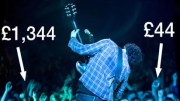 On 22 February 2012 Mr Justice Hildyard dismissed an application by online secondary ticketing operator Viagogo for an injunction to restrain the broadcast of a Channel Four “Dispatches” programme. On Thursday 23 February 2012, the Master of the Rolls refused Viagogo permission to appeal. The programme, “The Great Ticket Scandal” was broadcast at 9pm that evening on Channel 4 and can be seen here on 4OD.
On 22 February 2012 Mr Justice Hildyard dismissed an application by online secondary ticketing operator Viagogo for an injunction to restrain the broadcast of a Channel Four “Dispatches” programme. On Thursday 23 February 2012, the Master of the Rolls refused Viagogo permission to appeal. The programme, “The Great Ticket Scandal” was broadcast at 9pm that evening on Channel 4 and can be seen here on 4OD.
Viagogo provides a secondary market for tickets for many different venues and events. Its main business does not involve itself buying and selling tickets. For the most part it offers a place where prospective sellers may record details of tickets they are offering for sale, and prospective buyers may find the tickets they want and buy them directly from the seller.
A reporter had obtained a job at Viagogo’s London headquarters. He had signed a confidentiality agreement. Whilst he worked there he had obtained undercover footage which was said by programme maker, Hardcash, to reveal that the company’s depiction of itself was not accurate. Hardcash claimed
- The majority of tickets offered for sale through Viagogo are not from individual fans but from large scale professional ticket resellers or tickets allocated by promoters to Viagogo.
- Viagogo staff compete directly with real fans to buy tickets from primary ticket sellers, like Ticketmaster, for in demand events as soon as they go on sale. To get around systems put in place to prevent bulk buying of tickets, Viagogo staff use multiple credit cards registered to different addresses.
- Viagogo has a special team dealing with large scale professional ticket resellers – known as “power sellers”, or “brokers” who account for a significant percentage of overall ticket sales on their exchange.
- There was an argument that Viagogo’s practices contravened consumer legislation.
Viagogo applied to Chancery Division judge, Mr Justice Hildyard, for an interim injunction to restrain breaches of confidence by the undercover reporter.
The Judge refused Viagogo’s injunction application, after applying section 12(3) of the Human Rights Act 1998, on the grounds that he was not satisfied that Viagogo would succeed at trial in showing that the information was confidential, and that in any event, that there was a clear public interest in correcting the false image that they had put forward to the public.
In carrying out a balancing exercise, Mr Justice Hildyard took into account the express confidentiality clause that had been signed by the undercover reporter and that some of the information had been obtained by covert means. However, he concluded that the balancing exercise favoured the defendants and Viagogo had not satisfied the court that it was likely to succeed at trial. The Judge also held that the claim was likely to be a libel action in disguise.
The following day, Thursday 23 February 2012, Viagogo went to the Court of Appeal and sought permission to appeal from the Master of the Rolls. On at an oral hearing he refused permission.
The judgment of Mr Justice Hildyard is not yet available but we will have a case comment in due course.
Viagogo subsequently defended its practices in comments to the BBC. Viagogo UK director Ed Parkinson said that its business model was to “guarantee that buyers get their tickets and sellers get paid”.
“We allow anyone to sell on our marketplace and the overwhelming majority of our sellers are individuals but it also includes larger sellers which can include concert promoters. We don’t discriminate. We allow anyone to sell on our market place as long as they deliver the tickets that they sell.”
The issues have been widely discussed on the web, including these pieces
- Issues management response to C4 Dispatches divides Viagogo and Seatwave – The Drum
- Viagogo Rip Off – Huff Post
- Online ticket reselling firms: a sleazy brand of capitalism typical of our times – Paul Mills, “Comment is Free”


0 Comments
2 Pingbacks